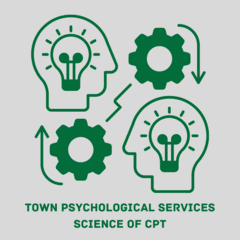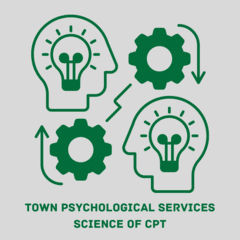Town Psychological Services
最近の記事

What is Cognitive Behavioural Therapy (CBT)?
Welcome to 3rd episode of Psych On The Mic where we delve into the world of Cognitive Behavioural Therapy (CBT) and explore its profound impact on mental health. In this episode, we uncover the essence of CBT, a widely used and highly effective form of psychotherapy. Join us as we break down the core principles of CBT, a treatment that focuses on identifying and challenging negative thought patterns and behaviors. Visit https://townpsychology.ca/cognitive-behavioural-therapy/ and learn how CBT empowers individuals to develop healthier thinking habits, cope with stress, and improve their overall well-being. We will discuss: 1. The Fundamentals of CBT: Understanding what CBT is, how it works and its key components, including cognitive restructuring and behavioural activation. 2. Applications of CBT: Exploring the diverse range of mental health issues CBT can address, from depression and anxiety to PTSD and OCD. 3. Real-life Success Stories: Hearing firsthand accounts of individuals who have benefited from CBT, showcasing its transformative potential. 4. Practical CBT Techniques: Simple, actionable strategies you can implement in your life's routine to enhance your mental health. Whether you're curious about CBT for personal growth, considering therapy, or simply interested in psychology, this episode provides valuable insights and practical knowledge. Tune in to discover how Cognitive Behavioural Therapy can be a powerful tool for positive change in your life. Subscribe to Psych On The Mic today, and embark on a journey toward mental clarity and emotional resilience with Town Psychological Services. Additional Resources: https://medium.com/@businesspad/key-pieces-of-cognitive-behavioral-therapy-cbt-d91e1d65a019 https://subjective.fitness.blog/2024/04/03/5-habits-scientifically-shown-to-reduce-anxiety/ https://newsabout.ca/how-to-find-the-right-cbt-therapist-in-ontario/ http://www.apsense.com/article/promoting-wellbeing-and-resilience-through-psychological-services.html

The Science Behind Cognitive Processing Therapy (CPT)
This episode dives deep into the science of CPT, explaining how it rewrites the script in your mind. No psychobabble, just practical strategies to finally break free from negativity. Join us and unlock the power to heal, thrive, and live the life you deserve. Follow https://townpsychology.ca/cognitive-processing-therapy/ to learn more The science behind Cognitive Processing Therapy (CPT) centers on the idea that our thoughts, emotions, behaviors, and bodily sensations are all interconnected. Here's a breakdown of the key concepts: Cognitive Processing: Our brains naturally try to make sense of experiences, especially traumatic ones. This processing can lead to the formation of beliefs about ourselves, the world, and the future. However, after trauma, these beliefs can become distorted and unhelpful. Cognitive Distortions: These are negative thinking patterns that can worsen our emotional state and hinder recovery. Examples include: 1. Jumping to Conclusions: Assuming the worst without evidence. 2. Emotional Reasoning: Believing your emotions are facts ("I feel worthless, therefore I am worthless"). 3. Catastrophizing: Blowing out of proportion the likelihood of negative outcomes. The Science of Change: CPT is built on well-established principles from cognitive psychology. Here's how it works: 1. Identifying Cognitive Distortions: The therapist helps you recognize unhelpful thinking patterns associated with your trauma. 2. Cognitive Restructuring: You learn to challenge and re-frame these distortions with more balanced and realistic beliefs. 3. Emotional Regulation: By changing your thoughts, you can learn to regulate your emotions and develop healthier coping mechanisms. Evidence for Effectiveness: Extensive research supports the effectiveness of CPT in treating PTSD and other conditions. Studies show CPT can significantly reduce: 1. Intrusive thoughts and memories 2. Avoidance behaviors 3. Negative emotions like depression and anxiety Brain Imaging: While research is still ongoing, some studies using brain imaging suggest that CPT may actually alter brain activity in areas related to emotional processing and memory. Overall, the science behind CPT emphasizes the power of our thoughts to influence our emotional state and overall well-being. By learning to identify and challenge unhelpful thinking patterns, CPT empowers individuals to take control of their mental health and build a brighter future.

Psych On The Mic
Ever wondered what goes on behind the closed door of a therapist's office? In this episode we ditch the stigma and dive into the world of psychology with an actual psychologist! We'll discuss about how therapy can help with everything from everyday stress to anxiety and depression. Visit https://townpsychology.ca to learn more about In coming episodes, we'll also explore different types of therapy and answer your burning questions like "Is therapy right for me?" and "What should I expect in a session?" So, grab your headphones and get ready to learn how to take charge of your mental health!


